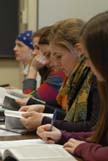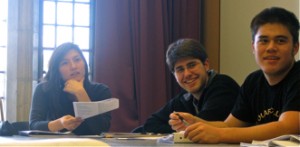The Great Conversation is a sequence of five courses which introduces the major epochs of Western civilization to students via great works of human achievement.
Beginning with the study of the ancient Greeks and Hebrews, the program traces the evolution of literacy and artistic expression, philosophic thought, religious belief, and the sciences of human behavior into the modern world. Students who complete the program bring a broad grounding in most of the liberal arts to their majors, to other courses, and to their study of other cultures.
Students in The Great Conversation are not passive recipients of information about their intellectual heritage. Rather, they respond to great works in an interdisciplinary way, challenging the ideas expressed in the works and challenging their own ideas as well, thus joining in the great conversation of men and women through the ages about perennial issues of human life.
Students who enroll in The Great Conversation are diverse in their aspirations. Students who have completed the program have majored in biology, classics, political science, chemistry, literature and language, music–the whole range of liberal arts. The knowledge and skills acquired through The Great Conversation apply to all disciplines, and are useful throughout adult life.
Testing Beliefs
The Great Conversation challenges students to share ideas orally and in writing, to focus thoughts into constructive, organized patterns, to explore difficult ideas and themes through discussion with classmates, led by experienced instructors.
Class discussion will very likely test beliefs, pique curiosity, and shatter preconceptions. Great Conversation students encounter great works of art and music as well as reading epics, plays, novels, and philosophical, political, and religious documents, becoming acquainted with works from Genesis and Homeric epics to Darwin’s Origin of Species and the paintings of Picasso.
The Great Conversation is a program for those who like to read, discuss and write about ideas. It is for those who believe that learning about the past is profoundly relevant to understanding the present, for those who want to examine the Western tradition in a unified way, and for those who believe that an education ought to cultivate discriminating minds, inquisitive spirits, and moral sensitivity.
For further information regarding the Great Conversation, please read this article about the program, featured in the St. Olaf Magazine in Winter 2003: The Great Books
What Great Con students say …
 “The Great Conversation is a great background for any major. We all learned to think critically, write comprehensively, and discuss considerately. My math and science major friends appreciated the chance to study Western humanities that they wouldn’t have in their major courses, while history, philosophy, religion, and literature majors found that ‘Con’ books and themes turned up again and again.
“The Great Conversation is a great background for any major. We all learned to think critically, write comprehensively, and discuss considerately. My math and science major friends appreciated the chance to study Western humanities that they wouldn’t have in their major courses, while history, philosophy, religion, and literature majors found that ‘Con’ books and themes turned up again and again.
“If someone had told me in my last semester of high school to read Plato, Marguerite de Navarre, and Nietzsche and draw conclusions about human self perception or the role of women, I would have been stumped. Two years of the Great Conversation gave me a supportive, exciting atmosphere in which to tackle works like these. Now I have the skills to read almost anything I want, and if I get confused, I try my favorite ‘Great Con’ technique: go find another ‘Conner’ late at night, make some hot chocolate or tea, and start a discussion that can last for hours.
“The great conversation is simply the most amazing academic experience I had on … campus.”
— Beth Truesdale, Bexley, Ohio
English and Chemistry major,
1997 Rhodes Scholar

You must be logged in to post a comment.